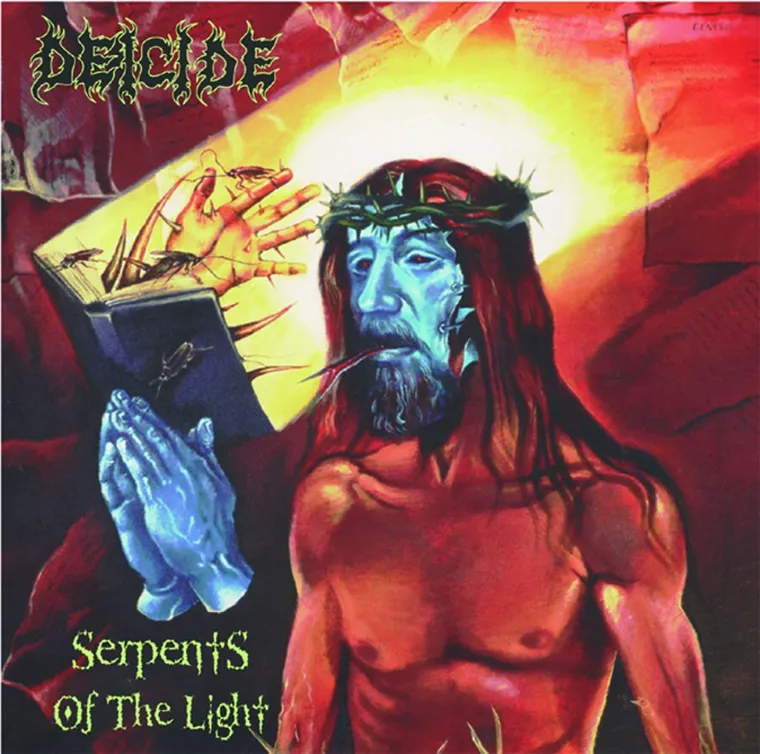Released on October 21, 1997, Deicide’s Serpents of the Light didn’t reinvent death metal — it sharpened it. This wasn’t reinvention for the sake of evolution. It was a raw, relentless affirmation of everything that made the genre terrifying, spiritual, and furious.
At a time when many death metal bands were experimenting with groove, prog, or clean production, Deicide doubled down. They didn’t soften. They didn’t stretch. They struck. Serpents of the Light is a lean, mean, anti-religious war cry — short on subtlety, long on fury.
If early Deicide was pure blasphemous fire, this album is that same flame, but funneled through a more controlled, sharpened lens.
From Hellfire to Hooks: A Band Holding the Line
Deicide has never been about nuance. From the start, they came in swinging — fast, hateful, and unapologetically anti-Christian. Their first few records, especially the self-titled debut and Legion, were brutal, dense slabs of sacrilegious chaos. But with Serpents of the Light, the band found a balance between speed and structure.
This wasn’t about maturity. It was about efficiency.
The songs here are tighter, the riffs more memorable, and the arrangements more digestible — without losing the venom that put Deicide on the map. Glen Benton still sounds like a man possessed, Steve Asheim’s drumming is still a barrage of blast beats and fills, but the songwriting feels more focused than ever.
At under 30 minutes, Serpents doesn’t overstay its welcome. It arrives, destroys, and leaves scorched earth behind.
Riffs and Wrath: What Serpents of the Light Sounds Like
The album kicks off with the title track, and within seconds, you’re pulled into the storm. The riff is simple but catchy, with just enough thrash flavor to groove while Benton's growl curses the heavens. There's a near punk energy to it — stripped-down, straight-to-the-point, and violently effective.
From there, it’s a barrage: “Bastard of Christ,” “Blame It on God,” “This Is Hell We’re In” — each track a two-to-three-minute sledgehammer. There’s no filler, no atmospheric interludes, just riff after riff, snarled over with Benton’s dual-layered vocals — still one of the most unique and unsettling sounds in death metal.
The guitar work from the Hoffman brothers doesn’t aim for technical acrobatics, but it doesn’t need to. Solos are short and sinister, often chaotic, always appropriate. They don’t dazzle — they stab.
Even late-album cuts like “Slaves to the Cross” and “The Truth Above” show no signs of fatigue. If anything, they sound even more pissed off — as if the band somehow got angrier the further into the tracklist they went.
Rage Refined: The Beauty of Blasphemy
There’s a strange kind of purity to Serpents of the Light. Not in its themes, obviously — Benton’s lyrics are still as anti-religion and confrontational as ever — but in its delivery. This isn’t posturing or gimmickry. The hate feels real. And whether you agree with the message or not, that conviction is hard to deny.
And yet, there’s a sense of discipline here. Unlike the more chaotic Legion or the raw fury of the debut, Serpents plays like a band fully in command of their weapons. The pacing, the structure, the compact songwriting — everything is dialed in.
You won’t find emotional depth or dynamic range here. That’s not the point. The emotion comes from sheer force — like standing too close to a jet engine. There’s a beauty in that level of commitment.
The Production: Gritty Yet Clear
Produced by Scott Burns, Serpents of the Light benefits from a clean-but-not-clinical mix. The guitars are sharp and crunchy, the drums punchy without being over-polished, and the bass — often lost in death metal mixes — is present and dirty, just enough to rumble underneath the chaos.
But the real standout is Benton’s voice. His dual-tracked growls and screams are front and center, as they should be. Whether he's barking anti-God screeds or layering guttural growls with high snarls, the production lets his voice cut through like a chainsaw through altar cloth.
It's not pristine, but it’s not supposed to be. It’s gritty in all the right ways — a snapshot of late-‘90s death metal production done well.
The Legacy: Death Metal’s Iron Backbone
Serpents of the Light might not get mentioned in the same breath as landmark albums like Altars of Madness or Tomb of the Mutilated, but it absolutely deserves its place in the conversation. It’s not an album that changed the game — it’s one that reinforced the foundations.
At a time when other bands were looking to expand, Deicide went inward. They distilled their sound down to its purest form. Fast. Hateful. Relentless. In doing so, they created one of the most consistent, re-listenable records in their catalog.
It’s a death metal album made by lifers, for lifers.
Final Verdict: 8.5 / 10
Serpents of the Light is not flashy. It’s not experimental. It doesn’t push boundaries. But that’s exactly what makes it so effective. It’s a half-hour of unfiltered Deicide — punishing, unapologetic, and locked in.
If you're looking for innovation, look elsewhere. But if you want a no-frills death metal experience that still holds up decades later, Serpents delivers with fire and fury.
It’s not Deicide’s most complex work, but it might be their most focused. And sometimes, that’s more powerful than progress.

